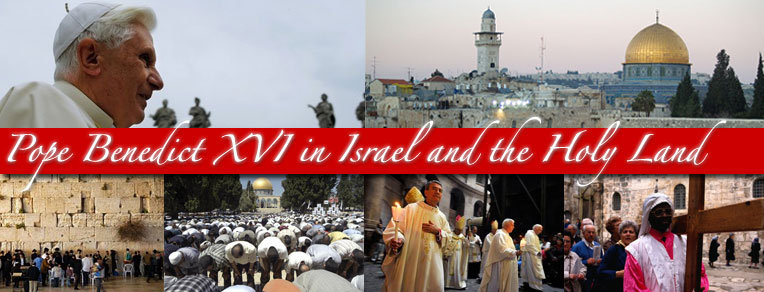"A state welcome for the pope would be turning our backs on the millions of Jews who were killed in the shadow of the Christian religion of grace and mercy," Ben Ari was quoted as saying by Israeli media. "This pope was a member of the Hitler Youth."The claim that Pope Benedict XVI harbors Nazi sympathies and is anti-semitic is born of complete ignorance about the life of the Holy Father. That he was an obligatory and unwilling "member" of the Hitler Youth is true, as far as it goes. And from the way this fact has been presented, one might assume this is one of those dirty little skeletons the Pope kept tucked away in his closet (next to his Inquisitor's sword and the token heads of renegade theologians).He made the comments at a Knesset session in which he called on lawmakers to rethink the pope's visit.
Ben Ari, a former member of the outlawed Kach movement [curiously, "barred from participating in the next election in 1988 under the revised Knesset Elections Law banning parties that incited racism" - Wikipedia], further said the Catholic Church is, and has always been, driven by anti-Semitic motivations.
 Actually, the then-Cardinal Ratzinger freely mentions this himself in his memoirs (Milestones: Memoirs: 1927 - 1977), indicating that he and his brother George were both enrolled in the Hitler Youth -- at a time when membership was compulsory. He discusses family life under the Third Reich in chapters 2-4 of his autobiography.
Actually, the then-Cardinal Ratzinger freely mentions this himself in his memoirs (Milestones: Memoirs: 1927 - 1977), indicating that he and his brother George were both enrolled in the Hitler Youth -- at a time when membership was compulsory. He discusses family life under the Third Reich in chapters 2-4 of his autobiography.
Likewise, John Allen Jr., journalist for the National Catholic Reporter and author of 2002's biography Cardinal Ratzinger: The Vatican's Enforcer of the Faith, provides the historical context sorely lacking in most exposes of this nature ("The Vatican's Enforcer", National Catholic Reporter, April 16, 1999):
See also:As a seminarian, he was briefly enrolled in the Hitler Youth in the early 1940s, though he was never a member of the Nazi party. In 1943 he was conscripted into an antiaircraft unit guarding a BMW plant outside Munich. Later Ratzinger was sent to Austria's border with Hungary to erect tank traps. After being shipped back to Bavaria, he deserted. When the war ended, he was an American prisoner of war.
Under Hitler, Ratzinger says he watched the Nazis twist and distort the truth. Their lies about Jews, about genetics, were more than academic exercises. People died by the millions because of them. The church's service to society, Ratzinger concluded, is to stand for absolute truths that function as boundary markers: Move about within these limits, but outside them lies disaster.
Later reflection on the Nazi experience also left Ratzinger with a conviction that theology must either bind itself to the church, with its creed and teaching authority, or it becomes the plaything of outside forces -- the state in a totalitarian system or secular culture in Western liberal democracies. In a widely noted 1986 lecture in Toronto, Ratzinger put it this way: "A church without theology impoverishes and blinds, while a churchless theology melts away into caprice."
- Ratzinger a Nazi? Don't Believe It! by Sam Ser. Jerusalem Post April 18, 2005 - written in response to an article that appeared in the Sunday Times (London) on April 17, 2005.
- New Pope Defied Nazis As Teen During WWII, by the Assoc. Press. New York Times April 23, 2005.
- Jewish leaders say pope's past cause for optimism, not concern, by Cindy Wooden. Catholic News Service. June 13, 2005.
- Pope Benedict, the Jews and the State of Israel Catholic Friends of Israel May 6, 2009.










No comments:
Post a Comment